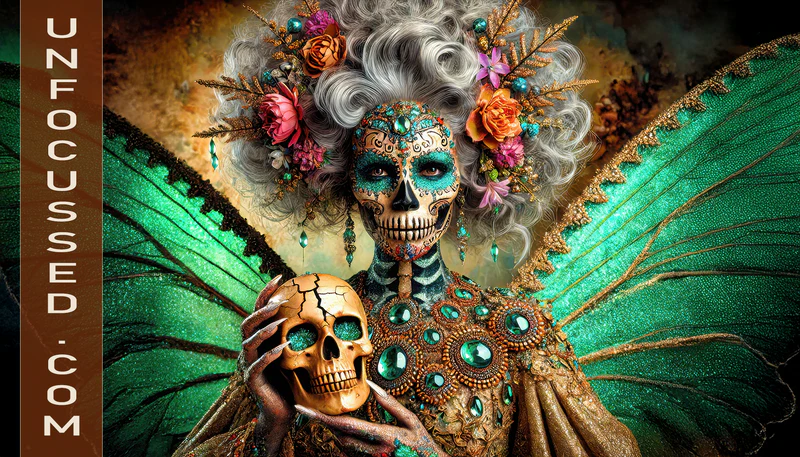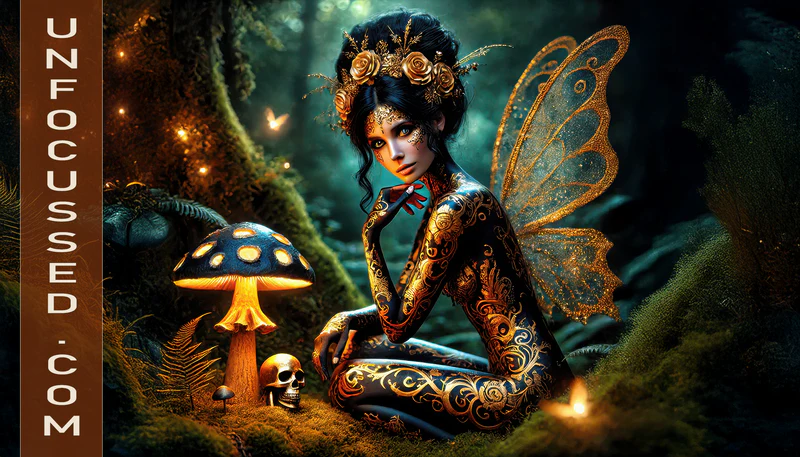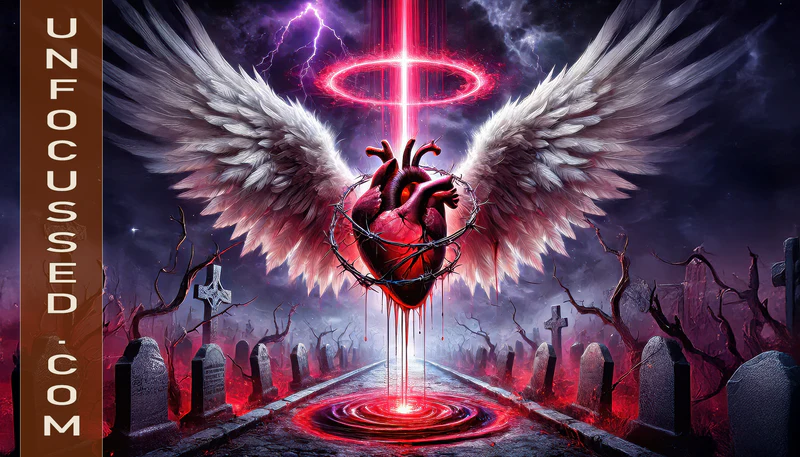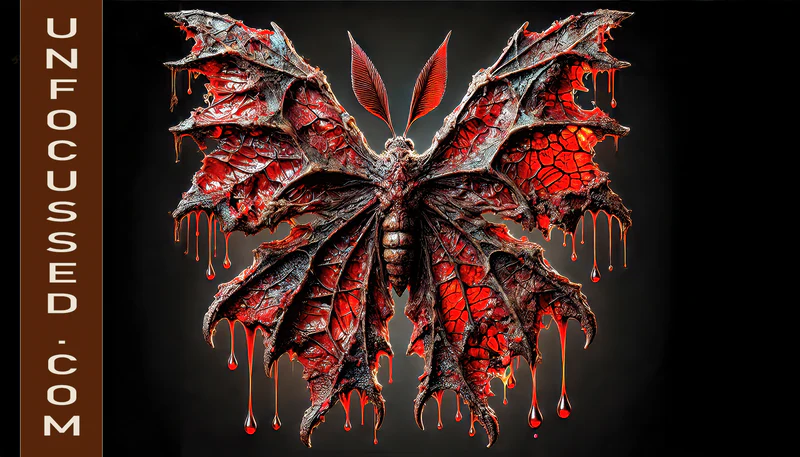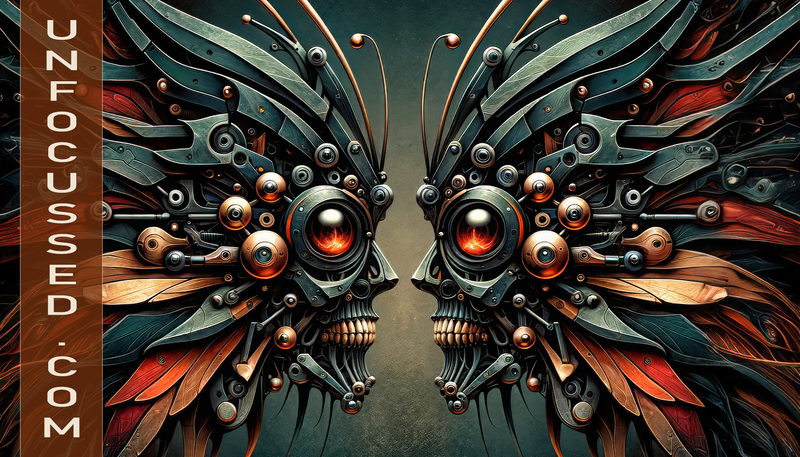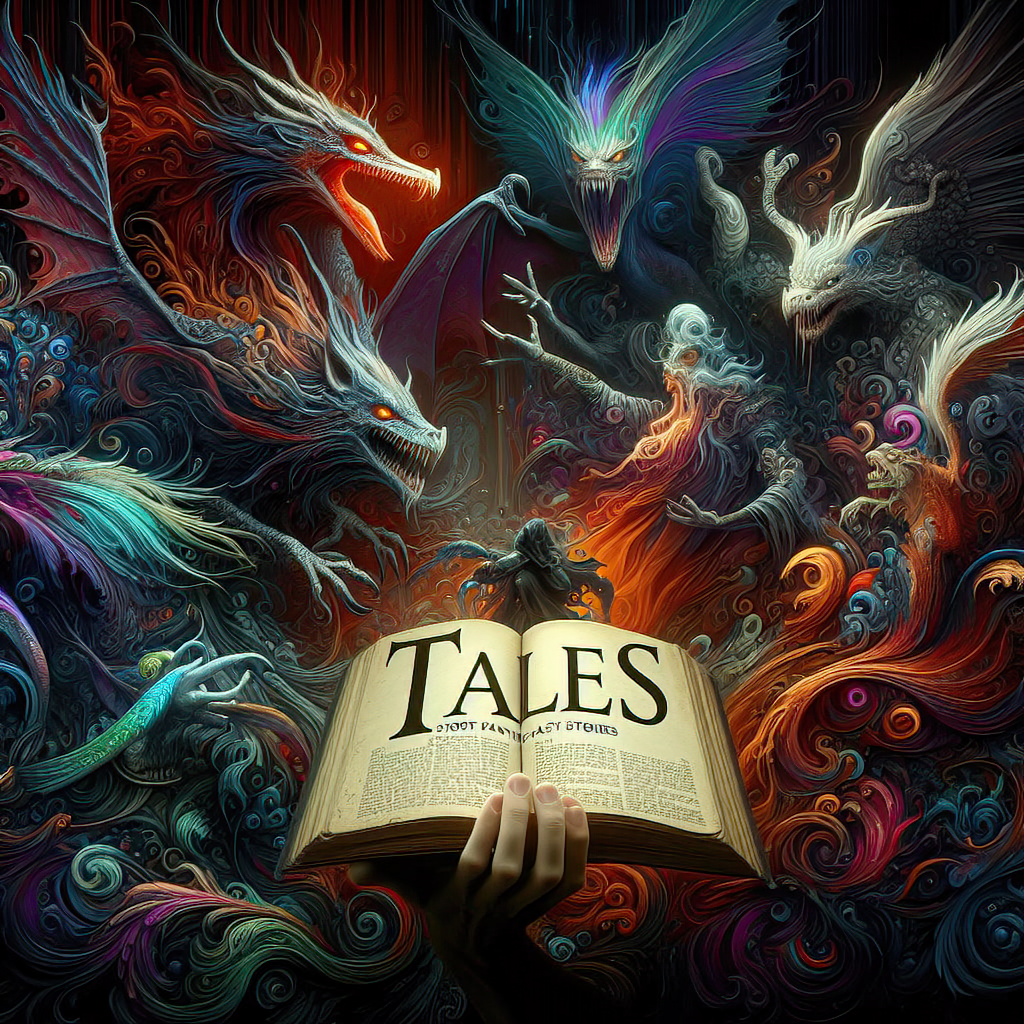by Bill Tiepelman
Gilded Dreams in Twilight Woods
The first rule of being a fairy queen? Don’t eat the glowing mushrooms. The second rule? Absolutely don’t stare into the abyss of a bioluminescent mushroom’s soul unless you enjoy existential crises at inconvenient times.
Yet here she was, Queen Lysaria of the Gilded Vale, kneeling before one such mystical fungus, contemplating her life choices. The thing pulsed softly, casting golden light over her intricate tattoos—arcane markings that looked regal but mostly just reminded her of that one time she got blackout drunk and let an overenthusiastic warlock “enhance” her aesthetic.
“Ugh. You again.” She exhaled dramatically, addressing the tiny golden skull nestled in the moss beside her. “What are you even doing here, Morty? You’re dead. Move on.”
The skull, unsurprisingly, remained silent. Typical.
A Queen’s Responsibilities (And Other Nonsense)
Ruling an enchanted forest was exhausting. Sure, the job came with perks—glowing wings, an uncanny ability to manipulate moonlight, a harem of aggressively devoted satyrs—but it also came with an absurd amount of administrative work. Who knew fae taxes were a thing? Who was even paying them? No one had currency! Just trinkets, riddles, and the occasional stolen pocket watch.
Last week, she spent two hours settling a border dispute between a family of talking foxes and a clan of sentient mushrooms. The foxes wanted to build a den. The mushrooms claimed ancestral land rights. Ancestral land rights. They were mushrooms.
“Honestly,” Lysaria muttered to the mushroom she was now addressing like an unpaid therapist, “if one more tree spirit petitions me about ‘excessive owl hooting’ at night, I’m going to personally train every owl in the kingdom to recite poetry at full volume.”
The mushroom twinkled in response. Rude.
The Curse of Eternal Beauty
It wasn’t that Lysaria hated being queen. It was that she hated work. And expectations. And—most tragically of all—being stunningly beautiful but still legally obligated to attend council meetings.
Centuries of immortality had kept her looking like an elven supermodel, which was fantastic for seduction purposes but absolutely wretched when it came to avoiding responsibility. Everyone just assumed that because she was stunning, she had her life together. Hilarious.
She adjusted the delicate golden crown atop her head—half out of habit, half to make sure it was still there, because losing a royal headpiece in a magical forest was a logistical nightmare.
“What do I even want?” she pondered aloud, mostly to irritate the silent skull. “I mean, besides unlimited wine, zero responsibilities, and a sentient bathtub that whispers compliments?”
The wind rustled in what she could only assume was judgment.
A Plan (Or Close Enough)
Suddenly, an idea. A stunningly reckless idea.
“You know what?” She stood, brushing moss off her impossibly well-fitted gown. “I’m taking a sabbatical. A well-earned break from royal nonsense.”
The mushroom flickered disapprovingly.
“Oh, don’t look at me like that. What’s the worst that could happen?”
The wind whispered again. The fireflies dimmed. The very air seemed to shudder.
Somewhere in the distance, a tree spirit screamed.
Queen Lysaria grinned. This was going to be fun.
Adventures in Irresponsibility
The plan was simple: disappear for a while. Let the kingdom figure itself out. If the trees started warring with the river spirits again, they’d just have to deal with it. Not her problem.
She’d go incognito—maybe dye her hair, swap the crown for an edgy hooded cloak, and pretend to be a mysterious wanderer. Maybe she'd con some humans into buying enchanted trinkets for exorbitant prices. Maybe she’d find a nice fae tavern and get irresponsibly drunk on moonberry wine.
The possibilities were endless.
Just as she was about to turn and leave, a deep, unmistakable sigh came from the skull.
Lysaria froze.
“Morty,” she said slowly. “Did you just sigh?”
The skull remained silent.
She crouched down, narrowing her eyes. “I swear on my own ethereal beauty, if you’ve been sentient this whole time and just letting me rant to you like a lunatic—”
The skull rattled. Ever so slightly.
“Oh, you little—”
Before she could finish her (no doubt eloquent and biting) insult, a bright golden light erupted from the mushroom beside her, forcing her to stumble back.
“Oh, fantastic,” she muttered, shielding her eyes. “What now? Is it divine intervention? Have the gods decided I’m too gorgeous to be left unsupervised?”
The light pulsed, and suddenly, the entire forest exhaled.
The trees whispered. The leaves trembled. The skull? It laughed.
“Oh, you have got to be kidding me.”
Lysaria turned sharply as the golden glow coalesced into a shape. A figure. A tall, familiar, obnoxiously smug figure.
Standing before her, wrapped in shimmering gold light, was Morty. Mortimer the Eternal. A once-great, now-mostly-dead trickster god.
And he was grinning.
“Miss me?” he asked, voice dripping with amusement.
Lysaria closed her eyes, exhaled slowly, and considered all of her life choices.
“This,” she said, pointing at him, “is exactly why I need a vacation.”
Morty laughed again, stepping forward. “Oh, my dear Queen. If you’re looking for an escape, I have just the adventure for you.”
Lysaria narrowed her eyes. She should say no. She should say no.
Instead, she sighed dramatically and dusted off her gown.
“Fine,” she muttered. “But if this involves paperwork, I’m setting you on fire.”
Morty just smirked. “You always were my favorite.”
And with that, the forest exhaled again—this time, pulling them both into darkness.
Rule #3: Never Trust a Trickster God
In hindsight, Queen Lysaria should have known better. She should have turned around, walked straight back to her unnecessarily extravagant throne, and resumed pretending to care about border disputes between talking foxes and melodramatic mushrooms.
But no. She had to be curious.
Now, she was plummeting through a swirling void of golden light and bad decisions, with Mortimer the Eternal—former god, current pain in her ass—floating beside her like he was enjoying a leisurely swim.
“You could have at least warned me,” she grumbled, trying to ignore the fact that gravity had seemingly taken a sabbatical.
Morty smirked. “Where’s the fun in that?”
Before she could launch into a well-deserved tirade, the golden vortex spat them out like a drunk tavern patron ejecting bad whiskey. Lysaria landed with a distinct lack of grace, her gown gathering an unreasonable amount of dust as she skidded to a halt on what she hoped was solid ground.
Morty, the bastard, landed on his feet.
“I hate you,” she informed him, brushing dirt off her regal gown.
“That’s what makes this friendship so magical.” He winked.
Welcome to the Absurdity
Lysaria took a moment to examine her surroundings. They were no longer in the enchanted woods of her kingdom. Instead, they stood in what could only be described as a marketplace designed by someone who had read about capitalism once and misunderstood it entirely.
Everywhere she looked, fae creatures bartered and haggled, exchanging everything from enchanted relics to what appeared to be… sentient vegetables? A goblin in an aggressively loud vest was trying to convince a very skeptical elf that his mushrooms would “absolutely not” cause hallucinations (they would). A mermaid, inexplicably in a floating bathtub, was selling bottled siren songs. And off to the side, a shady-looking sprite was peddling cursed jewelry with the energy of a back-alley salesman.
“Where are we?” Lysaria asked, rubbing her temples.
Morty spread his arms grandly. “Welcome to the Black Market of Bad Ideas. The finest collection of cursed, enchanted, and mildly illegal goods this side of the Veil.”
“…You brought me to a black market?”
“Correction: I brought you to the black market.”
Lysaria exhaled slowly. “Why?”
Morty grinned. “Because I need your help stealing something.”
And This is Where It Gets Worse
Lysaria blinked. “No.”
“Hear me out—”
“Absolutely not.”
Morty sighed, looking far too amused for someone being rejected. “You haven’t even heard what it is yet.”
“Let me guess: something dangerous?”
“That depends on your definition of danger.”
“Something illegal?”
“More… morally flexible.”
Lysaria pinched the bridge of her nose. “Morty, I swear on my stupidly perfect cheekbones, if this involves running from the Night Guards again, I will hex you so hard your skeleton forgets it had skin.”
Morty chuckled, patting her shoulder. “Relax, Queenie. We’re just going to borrow something.”
“From who?”
Morty’s smirk widened. “The Fae Bank.”
Lysaria stared at him. Then she turned around as if walking away from this conversation would make it disappear.
“Nope. Nope, nope, nope.”
The Heist of the Century (Probably)
Unfortunately, Morty was not deterred by strong language or well-placed glares. Instead, he kept pace beside her, talking like a particularly persuasive con artist.
“Think about it,” he said, voice dripping with charm. “A fae bank run by ancient bureaucrats. Magical vaults filled with untold treasures. The thrill of the heist.”
“The thrill of getting arrested,” Lysaria corrected.
“You act like that’s a bad thing.”
She turned to him, hands on her hips. “Morty, the last time we did something even remotely illegal, we were chased by a werewolf tax collector for three days.”
Morty grinned. “Ah, Geoff. Good guy. Terrible at card games.”
Lysaria sighed, rubbing her temples. “Fine. What, exactly, are we ‘borrowing’?”
Morty leaned in, voice low and conspiratorial. “The Golden Feather of Fate.”
She blinked. “The what now?”
“Legendary artifact. Controls luck, fate, and probability. Currently locked in the most secure vault in the market. Untouched. Unstealable.” His grin sharpened. “I want it.”
Lysaria crossed her arms. “And what, exactly, do I get out of this?”
Morty’s smile turned dangerous. “An adventure. A story worth telling. And, oh yeah—freedom from that whole ‘queenly responsibility’ thing you keep whining about.”
Lysaria stared at him. Considered her options. On one hand, this was deeply stupid. On the other hand…
She exhaled. “Fine. But if this goes sideways, I’m blaming you.”
Morty winked. “Wouldn’t have it any other way.”
The Plan (Which Is Not a Plan at All)
“Alright, let’s go over this one more time.”
Lysaria sat across from Morty in a dimly lit, extremely questionable tavern tucked in the back alleys of the Black Market of Bad Ideas. The clientele consisted of shadowy figures, morally ambiguous wizards, and at least one sentient cloak that was aggressively flirting with the bartender.
Morty, unfazed by their surroundings, leaned in with his usual smirk. “Simple. We break into the Fae Bank, avoid the Night Guards, get past the arcane security, steal the Golden Feather of Fate, and casually stroll out as if nothing happened.”
Lysaria sipped her wine. “That’s not a plan. That’s a list of things that will absolutely get us killed.”
“Details.”
She sighed, rubbing her temples. “Fine. Do we at least have disguises?”
Morty gestured to a pile of suspiciously obtained clothing. Lysaria frowned. “Why do these look like they belong to medieval accountants?”
“Because no one questions accountants.”
“…That’s terrifyingly accurate.”
Breaking and Entering (Emphasis on Breaking)
Step one: infiltrate the Fae Bank. Easy.
Step two: don’t get caught. Slightly harder.
Step three: avoid magical security. Borderline impossible.
They made it through the front doors without incident—Lysaria in a gray robe, Morty looking suspiciously comfortable in his bureaucratic disguise. The bank itself was a grand, towering structure made entirely of enchanted marble, gold filigree, and pure unbridled bureaucracy.
Elves, dwarves, and goblins bustled about, filing paperwork, exchanging magical currency, and arguing over obscure financial spells.
“I hate it here,” Lysaria muttered.
Morty patted her shoulder. “That’s the spirit.”
The Vault and Its Many, Many Problems
After some creative bribery (read: giving a disgruntled elf clerk a cursed amulet that made his enemies stub their toes forever), they gained access to the restricted floors.
“Alright,” Morty whispered as they approached the main vault. “Here’s where it gets tricky.”
Lysaria stared at the absurd number of security measures. The door alone was guarded by enchanted chains, shimmering runes, and at least three spectral accountants floating nearby, ready to audit anyone who tried to enter.
She turned to Morty. “Please tell me you actually have a way past this.”
Morty grinned. “Oh, absolutely.”
Then he pulled out a piece of paper and slapped it on the vault.
Lysaria blinked. “What… is that?”
“A strongly worded letter.”
“…You’re joking.”
The runes flickered. The chains rattled. The spectral accountants hesitated.
Then, slowly, the vault door swung open.
Lysaria’s jaw dropped. “What the—”
Morty winked. “Nothing in this world is more powerful than bureaucratic confusion.”
“You are deeply disturbing.”
“And yet, you’re still here.”
The Golden Feather of Fate (and Immediate Regrets)
The vault was massive. Piles of treasure sparkled in the dim light, enchanted artifacts hummed with power, and ancient relics floated ominously in protective fields.
And there, at the center of it all, sat the Golden Feather of Fate, pulsing softly with golden energy.
“Well,” Morty said, cracking his knuckles. “That was surprisingly easy.”
That was, of course, the exact moment everything went to hell.
The Problem With Divine Artifacts
The moment Lysaria reached for the feather, the entire room shook.
Alarms blared. The runes on the walls turned a violent shade of NOPE. The air itself thickened with ancient, vengeful magic.
Then, from the depths of the vault, a voice boomed:
“WHO DARES STEAL FROM THE HOUSE OF FATE?”
“…Ah.” Morty clapped his hands together. “So, minor issue.”
Lysaria glared at him. “Define minor.”
The shadows swirled. A gigantic, multi-eyed celestial being materialized, wings stretching across the vault, its eyes glowing with the knowledge of all existence.
“Ah, shit,” Lysaria muttered.
The entity turned its many eyes toward them. Judging.
“Okay,” Morty said, backing up. “So, technically, this was all Lysaria’s idea—”
“Excuse me?!”
The celestial being roared, shaking the entire bank.
Morty grabbed the feather. “Time to go!”
The Great Escape (a.k.a. Running for Their Lives)
They sprinted out of the vault, alarms ringing, magical defenses activating. Behind them, the celestial guardian gave chase, displeased.
Guards were mobilizing. Spectral accountants were writing reports aggressively. A dwarf was yelling about interest rates.
“This is the worst plan we’ve ever had!” Lysaria shouted.
Morty grinned, leaping over a table. “Disagree! Top five, maybe.”
They burst through the front doors, the entire city now aware of the heist.
“Plan?” Lysaria gasped as they ran.
Morty held up the feather, its magic swirling wildly. “Oh, I got one.”
Then, with a flick of his wrist, he snapped the feather in half.
Reality itself exploded.
How to Break Reality in Three Easy Steps
Step one: Steal the Golden Feather of Fate. Step two: Realize that was a terrible idea. Step three: Snap it in half and watch existence have a meltdown.
Lysaria had exactly 0.3 seconds to process what Morty had done before the world detonated around them.
The sky cracked like shattered glass. The air folded in on itself, warping into impossible colors. The celestial guardian let out a noise that could only be described as a divine entity’s version of a very displeased sigh.
And then—
Darkness.
Welcome to the Aftermath
When Lysaria opened her eyes, she was lying on her back, staring up at a sky that was… wrong.
The stars were in places they shouldn’t be. The moon had three extra faces, all of which were frowning in disappointment. And somewhere in the distance, reality itself hiccupped.
“Oh, fantastic,” she muttered. “We broke the universe.”
Morty sat up beside her, stretching like this was just another casual Tuesday. “You say that like it’s a bad thing.”
“Because it is a bad thing, you absolute goblin.”
She groaned, rolling onto her side, and took stock of their situation. They were in what looked like an endless void of golden mist, floating islands, and *way too many clocks* suspended in midair, ticking out of sync.
“Where the hell are we?” she asked.
Before Morty could answer, a booming voice echoed around them.
“YOU HAVE MEDDLED WITH FATE.”
Lysaria froze. “Oh, I hate that.”
In a burst of celestial light, the **Guardian of Fate** materialized before them, all shimmering wings, shifting eyes, and the unmistakable energy of something that has run out of patience.
Morty gave his best innocent smile. “Hello again.”
“YOU HAVE CAUSED IRREVERSIBLE DAMAGE TO THE THREADS OF DESTINY.”
Lysaria sighed, waving a hand. “Oh, come on. Irreversible? That seems dramatic.”
The guardian’s many, many eyes glowed. “THE MOON HAS THREE EXTRA FACES.”
“…Okay, that one’s on us.”
The Consequences of Being a Disaster
“So,” Lysaria said, dusting herself off. “What happens now? Do we get vaporized? Banished? Forced to do community service in the Realm of Endless Boredom?”
The guardian’s wings flared. “FATE CANNOT BE UNDONE. BUT IT CAN BE—”
It hesitated. Squinted at them.
Then, very slowly, exhaled.
“…RECALIBRATED.”
Morty leaned in. “Oh. That doesn’t sound so bad.”
The celestial being turned its full, unfathomable gaze upon him.
“YOU ARE BEING REASSIGNED.”
New Job, Who Dis?
Lysaria frowned. “Reassigned? To what?”
The air shimmered.
“NEW ROLES HAVE BEEN SELECTED.”
Morty, for the first time in his **mischief-filled** life, looked genuinely concerned.
“Hold on, I don’t—”
There was a flash of light.
And suddenly—
Queen Lysaria, Goddess of Minor Inconveniences
Lysaria opened her eyes to find herself seated on an **actual** throne made of what appeared to be lost socks, tangled necklaces, and every quill in the world that had ever run out of ink at a crucial moment.
She frowned. “What is this?”
The celestial voice boomed. “YOU ARE NOW THE GODDESS OF MINOR INCONVENIENCES.”
“…You absolute bastards.”
A divine scroll materialized in her hands. She glanced at it.
All shoes will now mysteriously contain a single grain of sand.
All cloaks will get caught on door handles at least once per week.
All enchanted mirrors will now give slightly delayed responses, just to be annoying.
All fae bureaucrats will find their paperwork mysteriously misfiled.
“…Actually, I’m okay with this.”
Mortimer the Eternal, Lord of… Paperwork
From across the divine plane, a **muffled scream of rage** echoed.
Lysaria turned to see Morty standing in front of an **endless** wall of filing cabinets.
He spun, horrified. “What is this?”
The guardian’s voice rumbled. “YOU ARE NOW THE OFFICIAL **FAE RECORD-KEEPER.**”
Morty paled. “No. No, no, no, no—”
Paperwork materialized in his hands.
He dropped it.
It reappeared.
“THIS ISN’T FUNNY.”
Lysaria smirked. “It’s a little funny.”
And So, A New Chapter Begins
And just like that, Queen Lysaria—former fae ruler, reluctant adventurer, and professional disaster—became an actual deity.
And Morty?
Morty was **damned to paperwork for eternity.**
“You’ll pay for this,” he muttered as he tried to escape an **onslaught of forms** that literally chased him through the divine halls.
Lysaria just sipped her divine wine, watching from her very comfortable throne.
“Oh, Morty,” she said, stretching lazily. “I already have.”
Gilded Dreams in Twilight Woods is now available in our Image Archive for prints, downloads, and licensing. Own a piece of this mystical, dark fantasy world and bring a touch of enchantment to your space.
➡ View & Purchase Here








